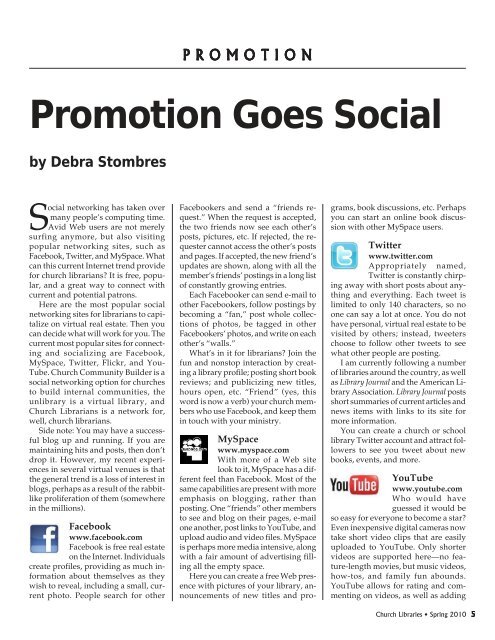CL winter 09-10 - Evangelical Church Library Association
CL winter 09-10 - Evangelical Church Library Association
CL winter 09-10 - Evangelical Church Library Association
You also want an ePaper? Increase the reach of your titles
YUMPU automatically turns print PDFs into web optimized ePapers that Google loves.
P P R R O O M M O O T T I I O O N<br />
N<br />
Promotion Goes Social<br />
by Debra Stombres<br />
Social networking has taken over<br />
many people’s computing time.<br />
Avid Web users are not merely<br />
surfing anymore, but also visiting<br />
popular networking sites, such as<br />
Facebook, Twitter, and MySpace. What<br />
can this current Internet trend provide<br />
for church librarians? It is free, popular,<br />
and a great way to connect with<br />
current and potential patrons.<br />
Here are the most popular social<br />
networking sites for librarians to capitalize<br />
on virtual real estate. Then you<br />
can decide what will work for you. The<br />
current most popular sites for connecting<br />
and socializing are Facebook,<br />
MySpace, Twitter, Flickr, and You-<br />
Tube. <strong>Church</strong> Community Builder is a<br />
social networking option for churches<br />
to build internal communities, the<br />
unlibrary is a virtual library, and<br />
<strong>Church</strong> Librarians is a network for,<br />
well, church librarians.<br />
Side note: You may have a successful<br />
blog up and running. If you are<br />
maintaining hits and posts, then don’t<br />
drop it. However, my recent experiences<br />
in several virtual venues is that<br />
the general trend is a loss of interest in<br />
blogs, perhaps as a result of the rabbitlike<br />
proliferation of them (somewhere<br />
in the millions).<br />
Facebook<br />
www.facebook.com<br />
Facebook is free real estate<br />
on the Internet. Individuals<br />
create profiles, providing as much information<br />
about themselves as they<br />
wish to reveal, including a small, current<br />
photo. People search for other<br />
Facebookers and send a “friends request.”<br />
When the request is accepted,<br />
the two friends now see each other’s<br />
posts, pictures, etc. If rejected, the requester<br />
cannot access the other’s posts<br />
and pages. If accepted, the new friend’s<br />
updates are shown, along with all the<br />
member’s friends’ postings in a long list<br />
of constantly growing entries.<br />
Each Facebooker can send e-mail to<br />
other Facebookers, follow postings by<br />
becoming a “fan,” post whole collections<br />
of photos, be tagged in other<br />
Facebookers’ photos, and write on each<br />
other’s “walls.”<br />
What’s in it for librarians? Join the<br />
fun and nonstop interaction by creating<br />
a library profile; posting short book<br />
reviews; and publicizing new titles,<br />
hours open, etc. “Friend” (yes, this<br />
word is now a verb) your church members<br />
who use Facebook, and keep them<br />
in touch with your ministry.<br />
MySpace<br />
www.myspace.com<br />
With more of a Web site<br />
look to it, MySpace has a different<br />
feel than Facebook. Most of the<br />
same capabilities are present with more<br />
emphasis on blogging, rather than<br />
posting. One “friends” other members<br />
to see and blog on their pages, e-mail<br />
one another, post links to YouTube, and<br />
upload audio and video files. MySpace<br />
is perhaps more media intensive, along<br />
with a fair amount of advertising filling<br />
all the empty space.<br />
Here you can create a free Web presence<br />
with pictures of your library, announcements<br />
of new titles and pro-<br />
grams, book discussions, etc. Perhaps<br />
you can start an online book discussion<br />
with other MySpace users.<br />
Twitter<br />
www.twitter.com<br />
Appropriately named,<br />
Twitter is constantly chirping<br />
away with short posts about anything<br />
and everything. Each tweet is<br />
limited to only 140 characters, so no<br />
one can say a lot at once. You do not<br />
have personal, virtual real estate to be<br />
visited by others; instead, tweeters<br />
choose to follow other tweets to see<br />
what other people are posting.<br />
I am currently following a number<br />
of libraries around the country, as well<br />
as <strong>Library</strong> Journal and the American <strong>Library</strong><br />
<strong>Association</strong>. <strong>Library</strong> Journal posts<br />
short summaries of current articles and<br />
news items with links to its site for<br />
more information.<br />
You can create a church or school<br />
library Twitter account and attract followers<br />
to see you tweet about new<br />
books, events, and more.<br />
YouTube<br />
www.youtube.com<br />
Who would have<br />
guessed it would be<br />
so easy for everyone to become a star?<br />
Even inexpensive digital cameras now<br />
take short video clips that are easily<br />
uploaded to YouTube. Only shorter<br />
videos are supported here—no feature-length<br />
movies, but music videos,<br />
how-tos, and family fun abounds.<br />
YouTube allows for rating and commenting<br />
on videos, as well as adding<br />
<strong>Church</strong> Libraries • Spring 20<strong>10</strong> 5


